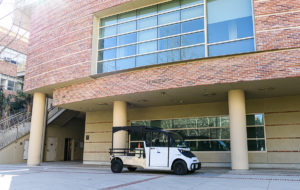This post was updated Nov. 12 at 8:24p.m.
The bridge connecting humanities and social sciences to the environment may not be as treacherous as we are conditioned to think.
There is a common misconception that the only way to solve environmental issues is through deep scientific understanding. Oftentimes, we imagine scientists tinkering away in labs or taking samples from obscure places as they work toward a solution to the climate crisis. The scientific jargon and acronyms scientists use are inaccessible to the general population. However, the way humanists and social scientists work with language is valuable for communicating with the population and fostering connection between scientific research and public action.
The humanities and social sciences have successfully achieved social change that would not be possible by science alone. These disciplines use narratives to connect the public to environmental issues. In social sciences, for instance, they often provide data to the government that support the development of policy and law.
While environmental sciences provide irrefutable data on climate change in the upcoming decades, it is the collaboration with humanities and social sciences that allows people to understand these complex issues on a personal level.
The humanities and social sciences should not leave this work up to STEM fields; rather, professionals can and should use their skills to tackle environmental issues.
“The solutions are not mysterious,” said Michael Ross, a political science professor who researches environmental politics. “We understand what we’re doing that’s causing the problem. The real problem is politics, and that’s what I study and take as my central focus.”
Ross added that climate change is the most discussed environmental issue of this century. In the United States alone, there are cultural, political and economic factors that impact our approach to climate change, he said.
There is a need for political scientists, especially to help the government and the public understand issues of climate change, he said. Political science students learn skills such as gathering and analyzing data that can be useful in environmental studies.
The humanities play a significant role in understanding how different cultures understand environmental changes. In doing so, humanities adds depth that scientific facts cannot do alone.
The Lab for Environmental Narrative Strategies uses tools from anthropology, history and literary studies to analyze narratives.
“Our task is to make people aware of those cultural differences and histories that then inform them,” said Ursula Heise, an English professor and interim director of the Lab for Environmental Narrative Strategies. “Histories of colonization have had a really important influence on how people perceive global changes and ecological crises.”
Heise added that the intersectionality of humanities and social sciences also extends internationally to how the global south and non-western nations understand their environments.
Many indigenous cultures have literary and artistic traditions to express their interactions with natural disasters and climate change, said Susanna Hecht, a professor in the Luskin School of Public Affairs and director of the Brazil Center and Institute of Environmental Studies.
“I work in Brazil, so it has a really strong El Niño set of events, and those events are memorialized,” Hecht said. “I’m looking at some drawings of the impacts of drought and how people are migrating and being displaced because of drought. Also, the music talks about it, and the poetry and literature talks about it.”
Along with the benefits of a different perspective through the humanities and social sciences, there are also similarities between these interdisciplinary fields and traditional science that can foster collaboration.
“A lot of our basic concepts of how you do scientific research are the same,” Ross said.
He added that political science uses tools like surveying and analyzing data, just like environmental scientists. Both sides are willing to talk and get insight from different perspectives.
Some students pursuing the humanities or social sciences might feel unprepared to discuss environmental issues without a traditional science background, yet their ability to evaluate different material in a familiar scientific method helps them take a different perspective.
“If you look in environmental history, what you see is that people are working from both the scientific data, from what we call the natural archive, but they’re also working from the human archive,” Hecht said.
She added that the human archive includes material written in indigenous languages in Latin America that have existed for 4,000 years.
Environmental historians, like scientists, draw from a body of data in a methodological way as well.
The humanities in particular are able to raise discussions on broader ethical and social issues in relation to the environment.
“The environmental movement in the United States has very much focused on science and policy,” Heise said. “Latin American environmentalism tends not to be a movement apart from other social movements. It’s always been part of fights for indigenous sovereignty and land rights, part of fights for women’s rights, part of campesino struggles.”
A multidisciplinary angle can uncover these insights that are missing from mainstream narratives. Storytelling is a unique way for humans to connect, in contrast to distant statistics.
“Get out of your building, go wander around. There’s wonderful things going on,” Hecht said.
Humanities and social science students have many opportunities to get involved in subjects outside their field. In the increasingly essential study of the environment, all disciplines must participate to create positive change.






Comments are closed.